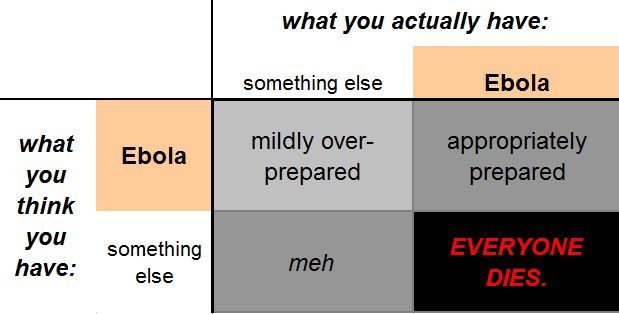Greg Mankiw is a Harvard economist, former chairman of President Bush's Council of Economic Advisers, and currently an advisor to the Romney presidential campaign. He teaches a large introductory economics course at Harvard and writes both the widely used Principles of Economics and a blog that displays the same crisp, eminently-readable prose as his textbook. In a show of solidarity with the Occupy Boston movement, some of his students walked out of that class earlier this year. Much has been written about the walkout (Update: here's the students' open letter and a response that outlines why walking out of this particular class isn't the most informed move.) Still I wanted to highlight Mankiw's column in yesterday's New York Times, titled "Know what you're protesting." I share some of his reaction:
But my second reaction was sadness at how poorly informed the Harvard protesters seemed to be. As with much of the Occupy movement across the country, their complaints seemed to me to be a grab bag of anti-establishment platitudes without much hard-headed analysis or clear policy prescriptions. Ironically, the topic of the lecture that the protesters chose to boycott was economic inequality, including a discussion of recent trends and their causes.
Fair. But later in the piece Mankiw says something that really rankles (emphasis added):
I don’t claim to be an economist of Paul Samuelson’s stature. (Probably no one alive can.) But like him, I have written a textbook that has introduced millions of students to the mainstream economics of today. If my profession is slanted toward any particular world view, I am as guilty as anyone for perpetuating the problem.
Yet, like most economists, I don’t view the study of economics as laden with ideology. Most of us agree with Keynes, who said: “The theory of economics does not furnish a body of settled conclusions immediately applicable to policy. It is a method rather than a doctrine, an apparatus of the mind, a technique for thinking, which helps the possessor to draw correct conclusions.”
That is not to say that economists understand everything. The recent financial crisis, economic downturn and meager recovery are vivid reminders that we still have much to learn. Widening economic inequality is a real and troubling phenomenon, albeit one without an obvious explanation or easy solution. A prerequisite for being a good economist is an ample dose of humility.
I'll preface my reaction to this with my own dose of humility: my studies at the Woodrow Wilson School this semester are my first exposure to serious economics, and I'm realizing every day that I have ever more to learn. I think it can be helpful to approach a field with fresh eyes so I hope my thoughts here won't be entirely discredited by my fresh arrival to the dismal science.
That said, No! This seems like denial, pure and simple. My impression is that one of the areas where economists have most often failed to display humility is when thinking of and talking about the interaction of their values and methodologies. Yes, economics has epistemological limitations, but these are equaled or surpassed by its axiological limitations, and may be more consequential because -- unlike with the more readily acknowledged methodological shortcomings -- economists themselves don't always make clear the values implicit in their worldviews. I think economists and those who are impacted by their views (ie, everyone else) would benefit from clearer statements of how values impact economics.
Mankiw's textbook does very briefly address the political philosophies underlying views on income redistribution, from utilitarianism to liberalism to libertarianism (pages 442-3 in the 5th edition). But this is halfway through the text and only in the context of the chapter on "income inequality and poverty." In reality, your views on maximizing utility for all versus (at another extreme) only caring about how policies affect the poorest have an impact on pretty much every piece of welfare economics. Here from what I can tell Mankiw is quite mainstream -- when considering the effects of a particular policy using the tools of welfare economics, the underlying philosophical preferences are almost always assumed. The conclusions of those studies are then touted as positive statements ("Policy X is bad for the economy") when that may or may not be true, depending on whether you share the same fundamental normative roots.
Prof. Mankiw spoke at Princeton on October 20 (you can view the lecture here) and it was a well-presented talk. His remarks were broad and intelligent, though maybe a bit constrained by the fact that he is associated with a presidential campaign and thus can't rock the boat too much (even with a disclaimer that his remarks were his own). In that talk Mankiw similarly began by emphasizing the need for economists to show greater humility in light of recent failures; he then proceeded to discuss a good number of specific policy recommendations with quite a bit of confidence. My biggest question coming out of the lecture was how to square the Mankiw who calls for greater humility from economists with the Mankiw who makes policy prescriptions. If we don't know with certainty what the impacts of particular policies will be or how to do more than tweak the performance or recovery of an economy, why not start with the policies least likely to do harm to the most vulnerable members of society? That would generally be my preference, growing out of my own nascent political philosophy.
In his textbook (5th edition page 35) Mankiw evenly explicitly notes that "Economists give conflicting advice sometimes because they have different values." This is true, and if anything it is under-emphasized. Elsewhere Mankiw has been more direct, contrasting the philosophies of Nozick and Rawls and noting how those might result in very different policy prescriptions on taxation. Mankiw ends up closer to Nozick and so it's no surprise that his policy prescriptions are for lower corporate taxes (re-emphasized in the Princeton talk as one of the things on which he very strongly agrees with Romney).
How is this anything but a heavy dose of ideology being injected into economics? How can we square this with the Mankiw who says he doesn't see the study of economics as "laden with ideology"? Part of the problem is that there are figures such as Mankiw who are concurrently serious researchers on scientific questions within economics and proponents of normative preferences in the political sphere. Can the outside observer tell when an economist is being one and not the other? Can economists realize this in themselves? When you couch these preferences in the language of economics without making the underlying values explicit, it's hard to believe that the field is not laden with ideology. To the extent that he doesn't even recognize how these value statements pervade the field, Mankiw is -- in his own words -- as guilty as anyone for perpetuating the problem.

